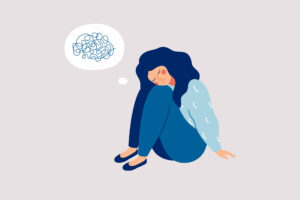Depression is a serious mental illness that can have a devastating impact on your life. If you or someone you know is struggling with depression, please take the time to read this comprehensive guide on how to overcome it. The information in this guide has been compiled from expert sources and will provide you with the tools you need to start fighting against resistant depression and get back on track.
Contents
What Is Resistant Depression?

Resistant Depression is a term that was first used by psychiatrists in the 1930s to describe cases of depression that did not respond to usual treatments. It is now considered a form of depression that is difficult to treat and can last for years.
Whatever the cause, resistant depression is a serious condition that requires treatment. There are many different methods available, but the most effective approach typically involves combining medication with psychotherapy or counseling.
If you are struggling with resistant depression, don’t hesitate to call your doctor or go see a therapist. You deserve to get the help you need to get back on track.
Causes of Resistant Depression

There are many causes of resistant depression, but the most common are psychosocial factors. This means that there is a combination of environmental and personal factors that can contribute to the development of resistant depression.
Stress
One of the most common causes of resistant depression is stress. Stress can increase the levels of cortisol and other hormones in the body, which can lead to a cascade of negative consequences, including resistant depression.
In addition, chronic stress can increase the risk of developing other mental health conditions, such as anxiety and PTSD. So if you are struggling with resistant depression and you think that your stressors may be contributing to your condition, it might be worth seeking out counseling or therapy to help you manage your stress better.
Personal History
Another common cause of resistant depression is personal history. This means that genetics and biological factors can play a role in the development of resistant depression.
For example, some people are more likely to develop resistant depression if they have a family history of the condition. And research has shown that certain genes may play a role in determining how easily someone responds to antidepressants. so if you think that your personal history might be contributing to your resistant depression, it might be worth discussing this with your doctor.
Medications
Some medications can also contribute to the development of resistant depression. For example, some anti-anxiety medications can cause resistant depression by increasing levels of cortisol in the body. And certain antidepressant medications can also lead to resistant depression.
So if you are taking antidepressants or other medications, it might be worth talking to your doctor about whether you might need to switch medications or dosage. And if you do experience resistant depression while taking medication, it might be worth considering switching to another form of treatment.
Medical Conditions
Resistant depression can also be a result of medical conditions. For example, if you have a history of bipolar disorder or major depression, then your body may be more likely to respond poorly to antidepressant medication. So if you are struggling with resistant depression and you think that your medical condition may be contributing to your condition, talk to your doctor about what steps you can take to improve your response to medication.
Trauma
Another main cause of resistant depression is trauma. This means that exposure to a traumatic event (for example, sexual assault or a car accident) can lead to the development of resistant depression.
Trauma can also cause physical and emotional scars that can impact how easily someone responds to antidepressants. So if you are struggling with resistant depression and you think that your trauma may be contributing to your condition, it might be worth seeking out therapy or counseling to help you work through your trauma.
Abuse
One of the most common causes of resistant depression is abuse. This means that emotional or physical abuse can lead to the development of resistant depression.
Resistant depression can also be a result of chronic exposure to stress or trauma. So if you are struggling with resistant depression and you think that your abuse might be contributing to your condition, it might be worth seeking out support from a mental health professional.
Symptoms of Resistant Depression

If you are experiencing symptoms of depression but they don’t seem to be going away no matter how hard you try, it might be time to start looking for resistant depression. The symptoms of resistant depression can vary from person to person, but they tend to include:
Persistent Feelings of Sadness
One of the main signs of resistant depression is that you continue to experience feelings of sadness even after trying different treatments or therapies. This might mean that your depression is not responding to the usual methods you use to treat it.
Irritability
If you are experiencing persistent irritability, this might be another sign that your depression is resistant. Irritability can make it difficult for you to manage your day-to-day life and can lead to conflict with others.
Low Energy Levels
If you find that you are having a lot of trouble getting out of bed in the morning or have a general lack of energy, this could be another sign that your depression is resistant. Low energy levels can make it difficult for you to take care of yourself. This can lead to problems at work or at home.
Decreased Sex Drive
If your sex drive has decreased significantly, this could be another sign that your depression is resistant. A diminished sex drive can make it difficult to feel pleasure in life and can lead to problems in the bedroom.
Weight Loss or Gain
If you notice that you are losing weight or gaining weight without any reason, this might be another sign that your depression is resistant. Weight loss or gain can indicate a disturbance in your body’s metabolism and can be a sign of serious health problems.
Difficulty Concentrating
If you find that your ability to concentrate has decreased significantly, this could be another sign that your depression is resistant. Difficulty concentrating can make it difficult for you to complete tasks at work or school. It can also lead to problems in your social life.
Restlessness
If you find that you are constantly moving around or cannot sit still for more than a few minutes, this could be another sign that your depression is resistant. Restlessness can make it difficult to get any peace and can lead to problems with sleep.
If you are experiencing any of the above symptoms, it might be time to see a doctor. If your depression is resistant to traditional treatments, it might be a sign that you need to see a psychiatrist or a therapist.
How Do Doctors Diagnose Resistant Depression?
There is no single answer to this question as there are a variety of tests that can be used to diagnose resistant depression. Some of the more common tests used to diagnose resistant depression include:
1. The Beck Depression Inventory (BDI) is a questionnaire that is designed to measure a person’s symptoms of depression.
2. The Montgomery-Asberg Depression Rating Scale (MADRS) is an instrument that can help to measure the severity of depressive symptoms.
3. The Hamilton Depression Rating Scale (HAM-D) measures the severity of depressive symptoms. It also includes items that are related to suicide ideation and attempts.
4. The Clinical Global Impression Scale (CGI-S) is a scale that measures how much someone’s overall condition has changed. This is since they were first evaluated for depression.
Treatment for Resistant Depression

Treating resistant depression can be a daunting task, but with the right approach, you can make significant progress. Many treatment methods can be used. The most effective approach depends on the individual and the specific features of their resistant depression.
Some common treatment methods for resistant depression include:
1. Psychotherapy. Psychotherapy is a type of treatment that involves one-on-one sessions with a therapist. The goal of psychotherapy is to help you explore your thoughts and feelings and to improve your mental health overall. Some people find psychotherapy helpful in treating resistant depression, while others find it less effective. If you are considering therapy as a treatment option, it’s important to talk with your doctor first to see if it’s a good fit for you.
2. Medications. Medications can be an effective way to treat resistant depression, depending on the specific drug and the dosage prescribed. Some medications used to treat resistant depression include antidepressants, anticonvulsants, and mood stabilizers. It’s important to discuss medication options with your doctor before starting therapy or taking medication, as both therapies can have side effects.
3 Electroconvulsive therapy (ECT). ECT is a treatment that uses electric shocks to trigger a seizure in patients with resistant depression. ECT is rarely used now, but it was once one of the most effective treatments for resistant depression. If you are considering ECT as a treatment option, it’s important to discuss your options with your doctor.
4. Complementary and alternative medicine (CAM). CAM includes treatments that aren’t typically considered part of conventional medicine, such as acupuncture and yoga. Some studies suggest that CAM may help treat resistant depression, but more research is needed. It’s important to discuss CAM treatments with your doctor before starting them, as they can have side effects and may not work for everyone.
5. Self-care Activities: One of the main goals of treatment for resistant depression is to help individuals improve their quality of life. This includes implementing strategies such as exercise, diet, and relaxation techniques. It’s important to find activities that work for you and that will help you feel happier and more in control.
Conclusion
If you are suffering from resistant depression, then this comprehensive guide is for you. In it, we have discussed the causes of resistant depression and provided tips on how to overcome them. We have also outlined different treatments that are available and explained why each one might be right for you. Finally, we also offer advice on how to maintain your recovery once it has been achieved. If you are struggling with resistant depression, then read through this guide and find relief that has lasted long-term.
Hope this article was of help to you! If you are suffering from mental health disorders, you may seek help from Therapy Mantra. We have a team of highly trained and experienced therapists who can provide you with the tools and skills necessary for overcoming mental health disorders. Contact us today to schedule an online therapy or download our free Android or iOS app for more information.


